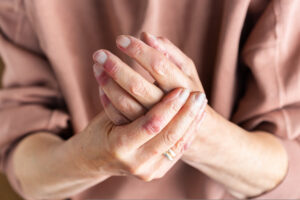When it comes to managing eczema, so much of the focus is on the reactive approaches: treating angry and flaring skin, investigating eczema triggers and adjusting daily routines to promote healthy skin. But what happens in the in-between, when your skin may be calm, but eczema and its effects on your mental health are still lurking beneath the surface?
“My mental state between flares is one of anxiousness,” said Sam Bitner, 26, who has lived with severe and often debilitating atopic dermatitis since she was an infant. “I feel like I am walking on a tightrope. If I make one wrong move, something bad will happen. It feels like at any given moment, my skin will start to burn.”
Oftentimes, the anticipation of another flare can cause mental stress for both the eczema patient and their loved ones.
Dealing with long-term anxiety
The unpredictability of eczema flares coupled with limited treatments to effectively alleviate itch, is directly related to symptoms of anxiety and/or depression.1,2 In fact, adults with eczema have a two-and-a-half to three-fold higher risk for anxiety or depression that increases with disease severity.3-7
People with eczema can often live in a constant loop of fear and anxiety as they wait for their next flare. It doesn’t matter if their skin is calm. This constant sense of the unknown can have a lot of negative impacts on their daily mental health.
“The lack of predictability and control in the lives of eczema patients and caregivers can create secondary stress and requires high levels of vigilance,” said Dr. Katrina Abuabara, a dermatologist and clinical epidemiologist at University of California San Francisco.
For Bitner, even her doctors added to her stress and her negative self-image. “I remember doctors looking at my skin and repeatedly apologizing for how it looked and how much inflammation there was,” Bitner said. “Seeing the concerned looks on their faces always made me ashamed of my skin so I would cover it at all times. I also remember doctors gasping when they saw my skin,” she said. “They would tell me I was a ‘unique case’ and go on to explain they have never seen a case so strange and severe. That would then make me feel even worse. Going through those experiences has made my body image suffer to this day.”
Trying to cope with the burdens of eczema can be very complicated and difficult to sort through for many people. “Many of the [patients] I work with experience both not wanting to stand out because of their eczema, and also wishing desperately that other people — teachers, friends, coaches, extended family — understood the burden they carry each day,” said Dr. Jennifer LeBovidge, a psychologist at the Atopic Dermatitis Center and the Food Allergy Program at Boston Children’s Hospital.
There are several ways to proactively try to cope with the ongoing stressors and anxiety of eczema — even when you’re not flaring.
1. Make time for things you love.
Devote time to hobbies or people who bring you joy. “I often speak with patients about what matters to them — valued activities and relationships, for example,” said Dr. LeBovidge. “Sometimes this takes some problem-solving but we want to make sure patients are engaging in things that build their self-esteem and contribute to wellness.”
2. Try talking to a therapist.
Healthcare professionals who are trained in holistic care can help eczema patients learn problem-solving skills, relaxation strategies, acceptance or ways to change thinking patterns to cope with the psychosocial burden of eczema.
“I am still trying to find a balance between acceptance and living beyond eczema,” said Bitner. “I have been going to therapy and journaling which has helped greatly. I finally admitted that it frustrates me that my body feels like it is always working against me. Once I started to discuss that with my therapist, my anger began to reside and acceptance started to become possible.”
Bitner still sees a therapist to overcome a lot of the body image issues she has because of her eczema.
Many people with eczema find support in connecting with others within the eczema community because those are the people who not only understand the daily burden of eczema symptoms, but also the space in between flares, when there’s time to process the mental and emotional components of living with a chronic condition (when the skin isn’t always the immediate concern).
“Eczema is a chronic condition that can have a big impact on daily life, but patients are more than their eczema and there are ways to increase their sense of control,” said Dr. LeBovidge.
Solving for gaps in both mental health and eczema care
Only recently are more eczema patients and doctors considering mental health in their treatment approaches.
Despite the clear connection between eczema and the increased risk for mental health conditions, a recent study found that 64% of resident dermatologists in the U.S. did not receive education on depression screening as part of their medical training or clinical practice, even though most residents said they thought depression screening was important to provide more whole-person care.8
Eczema researchers are currently working to develop and validate clinical assessment tools to evaluate mental health during an office visit. Examples include the Hospital Anxiety and Depression Scale (HADS)9 or the Patient-reported Outcome Measures Information System (PROMIS), which includes over 300 measures of physical, mental and social health for people living with chronic conditions.
Other patient-reported tools that can help measure quality of life, such as Skindex, also have the potential to provide an assessment of the emotional impact of eczema for adult patients.10,11
Tools like these can help quantify the patient experience for doctors enabling them to make more informed decisions.
“Increased awareness of the mental health burden of eczema could go a long way towards increasing support in daily life and incorporating mental health support into routine eczema care,” said Dr. LeBovidge.
Find more resources for eczema and mental health here.
References:
1. Sanders KM, Akiyama T. The vicious cycle of itch and anxiety. Neurosci Biobehav Rev. 2018;87:17-26. doi:10.1016/j.neubiorev.2018.01.009
2. Simpson EL, Guttman-Yassky E, Margolis DJ, et al. Association of Inadequately Controlled Disease and Disease Severity With Patient-Reported Disease Burden in Adults With Atopic Dermatitis. JAMA Dermatol. 2018;154(8):903-912. doi:10.1001/jamadermatol.2018.1572
3. Cheng BT, Silverberg JI. Depression and psychological distress in US adults with atopic dermatitis. Ann Allergy Asthma Immunol. 2019;123(2):179-185. doi:10.1016/j.anai.2019.06.002
4. Chiesa Fuxench ZC, Block JK, Boguniewicz M, et al. Atopic Dermatitis in America Study: A Cross-Sectional Study Examining the Prevalence and Disease Burden of Atopic Dermatitis in the US Adult Population. J Invest Dermatol. 2019;139(3):583-590. doi:10.1016/j.jid.2018.08.028
5. Yaghmaie P, Koudelka CW, Simpson EL. Mental health comorbidity in patients with atopic dermatitis. J Allergy Clin Immunol. 2013;131(2):428-433. doi:10.1016/j.jaci.2012.10.041
6. Silverberg JI, Gelfand JM, Margolis DJ, et al. Symptoms and diagnosis of anxiety and depression in atopic dermatitis in U.S. adults. Br J Dermatol. 2019;181(3):554-565. doi:10.1111/bjd.17683
7. Yu SH, Silverberg JI. Association between Atopic Dermatitis and Depression in US Adults. J Invest Dermatol. 2015;135(12):3183-3186. doi:10.1038/jid.2015.337
8. Streight KL, Dao H Jr, Kim SJ. Dermatology Resident Training on Depression Screening: A Cross-Sectional Survey. Cureus. 2020;12(6):e8861. Published 2020 Jun 27. doi:10.7759/cureus.8861
9. Silverberg JI, Margolis DJ, Boguniewicz M, et al. Validation of five patient-reported outcomes for atopic dermatitis severity in adults. Br J Dermatol. 2020;182(1):104-111. doi:10.1111/bjd.18002
10. Perez-Chada L, Taliercio VL, Gottlieb AB, et al. Achieving consensus on patient-reported outcome measures in clinical practice for inflammatory skin disorders. J Am Acad Dermatol. 2023;88(1):86-93. doi:10.1016/j.jaad.2019.09.008
11. Swerlick RA, Zhang C, Patel A, Chren MM, Chen S. The Skindex-Mini: A streamlined quality of life measurement tool suitable for routine use in clinic. J Am Acad Dermatol. 2021;85(2):510-512. doi:10.1016/j.jaad.2018.12.035






